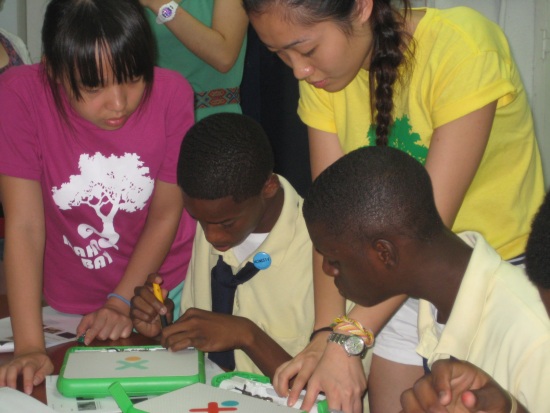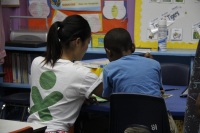Resumen en español al final del artículo

For three years, I've taken a group of high school girls from Columbus School for Girls (CSG) in Columbus, Ohio to St. John in the US Virgin Islands to do annual mini OLPC deployments. The two-week trip, under the guidance and partnership of Tim Falconer at Waveplace Foundation, is the culmination of a yearlong service learning course to prepare my students to teach Etoys, Sugar, and minor repairs to public school students at the Julius E. Sprauve School (JESS). From the very beginning, it was clear that this experience is invaluable to the CSG girls. They are exposed to many aspects of computer science in a compelling way - through service. But what wasn't clear to me until this year was whether or not it was equally valuable for the students at JESS. It always felt a little hollow that we'd come in, do our teaching, and leave again, without seeing anything happen in our absence.
Our trip in spring of 2012 was different, and by far our most successful. Reflecting upon it, I ask myself what was different and why. One of my conclusions is consistency and trust. During the first year, the JESS community was glad we came, but they probably expected our project to be a one-time, feel-good event with little lasting effect. At that time I couldn't have known whether CSG could sustain the program, so I couldn't make any promises.
When we returned to St. John the next year, the JESS community seemed surprised that we came back and we made progress. During that year, we were invited to teach during the school day rather than the after-school time slot we'd been given the year before. A big step in the right direction, but there still seemed to be little interest from the teachers in what we were doing. But momentum was building at home, so we launched into our third year.

This past spring during our third trip, something magical began to happen. Not only were we invited to teach during the school day, but we were invited to teach four different classes, six different grades, and spend three full hours per day teaching. Every teacher whose class we taught stayed with us to help. (A first for us!) And better yet, there were emerging plans to keep the program going in our absence. Something about the fact that this was our third visit and that we communicated plans to return in 2013 has caused the students, teachers, and administration at JESS to start investing their own time and effort into the program, which of course is making it better for everyone. These steps are small but significant. The trust is building, and the commitment from both schools is growing.
Beginning my fourth year of this program, I ask myself if there is a generalizable lesson in my story. Despite the notorious localization of school culture I find it twofold. By returning year after year, we are not only able to provide repetition that will help JESS revisit old content, and when appropriate, extend the content in new ways, but we are building trust. I'm told there's a saying in St. John that you don't have a conversation with someone until they've been on the island for ten years. This is certainly an exaggeration, but I understand the point. With so much transience, you don't want an "outsider" telling you what's best for your community. By coming back year after year, we've demonstrated our commitment to the school, its students, and the larger community. In return, they are beginning to start investing in the relationship. Of course it's a moving target. I teach my students to be "ready for anything" and we adapt as needed. Education never has a one-size-fits-all solution, but this is what's working for us, for now. I hope others can learn from our experiences.
Christine Murakami is the Technology Integration Specialist for the Upper School at Columbus School for Girls in Columbus, Ohio. She's committed to drawing girls to computer science through service and uses OLPC as a springboard.
Resumen en español: Este artículo documenta la experiencia de Christine Murakami, una especialista en la integración de tecnología de la Columbus School for Girls en Columbus, Ohio, EEUU, y su curso de aprendizaje de servicio. En este curso, que se realizó por tercera vez este año, un grupo de sus estudiantes se prepara para un año escolar aprendiendo sobre eToys, Sugar y los XO. Luego en primavera el grupo viaja a Saint John (San Juan) en las Islas Vírgenes de Estados Unidos para pasar dos semanas trabajando con los alumnos de una escuela local.


See also http://www.amazon.com/Trust-Schools-Resource-Improvement-Sociology/dp/0871541920
Well done! Keep up the great work.
This story illustrates three important points about OLPC projects around the world:
1. Projects evolve and early evaluations may be pre-mature
2. In class facilitators to assist teachers have very positive effects on outcomes
3. Students working with other students improve outcomes in a way that a teacher alone may not be able to do